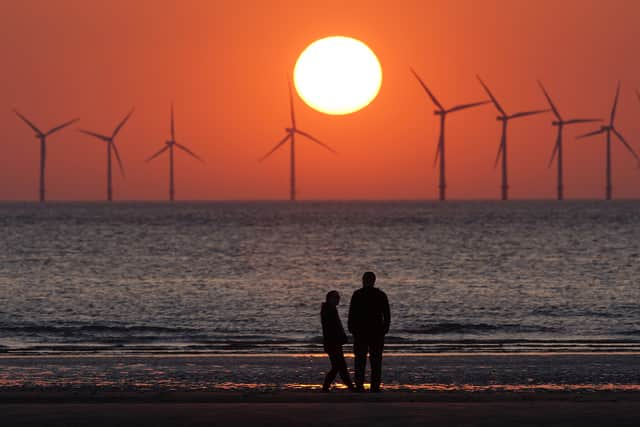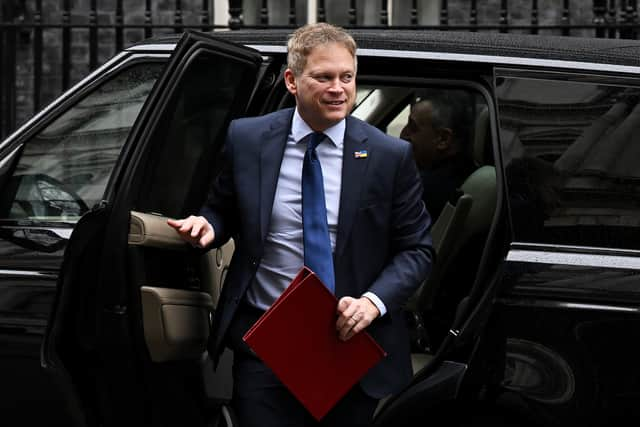Net zero plan: what is UK government’s Powering Up Britain green strategy, will energy security proposals work?
and live on Freeview channel 276
The government has unveiled its “Powering Up Britain” strategy to invest in nuclear power and renewable energy to reduce greenhouse gas emissions and energy costs.
Ministers say they want the UK to have the cheapest electricity in Europe by 2035, though they acknowledge that the plan is unlikely to lower costs in the upcoming year.
Advertisement
Hide AdAdvertisement
Hide AdBut environmental NGO Friends of the Earth (FoE) has said that after announcing a "dangerously lacklustre" set of climate policies, the government may be subject to additional legal action if the revised net-zero strategy fails to meet its legal obligations.
Last year, FoE, along with ClientEarth and the Good Law Project, took the government to the High Court over its net-zero strategy, which was found to be unlawful after the court ruled there weren’t enough policies in place to cut greenhouse gas emissions enough to adhere to legally required carbon budgets.
But what exactly is Powering Up Britain? How does it work, and - most importantly - will the strategy actually be effective? Here is everything you need to know about it.
What is Powering Up Britain?


Powering Up Britain is the government’s strategy to reduce emissions and bring down energy prices by bolstering nuclear and renewable energy sources. Ministers say they want the UK to have the most affordable electricity in Europe by 2035, but acknowledge the plan is unlikely to result in lower costs in the next year.
Advertisement
Hide AdAdvertisement
Hide AdIt is mostly centred on boosting clean energy in the UK, such as wind, solar and nuclear power, which is intended to lower emissions while simultaneously lowering energy costs.
The announcement of the first carbon capture sites - which use special equipment to capture and store CO2 emissions produced by power plants, factories and other industrial processes in a safe place - is one of many emission reduction strategies included in the net-zero initiative.
How will it work?
Energy Security Secretary Grant Shapps said the proposals would alter how customers are billed and eventually lower electricity bills. The plan is 1,000 pages long and contains hundreds of measures, ranging from large infrastructure projects to increased energy efficiency in residential buildings.
Among the Government’s announcements are £20 billion in funding for carbon capture; £160 million for port infrastructure to help expand offshore wind; support to insulate homes; establishing Great British Nuclear; offering £5,000 grants towards heat pump insulation and £10 billion to UK Export Finance.


Advertisement
Hide AdAdvertisement
Hide AdYet according to experts and Labour, the majority of these actions have already been announced, with Labour shadow climate and net-zero secretary Ed Miliband saying the most notable thing about the strategy was its “glaring omissions”.
Miliband said: “No removal of the onshore wind ban which is costing families hundreds of pounds on bills, no new investment for energy efficiency which could cut bills and imports, no response to the Inflation Reduction Act which could help Britain win the global race for clean energy jobs.
“What was billed with huge hype as the Government’s green day turns out to be a weak and feeble groundhog day of reannouncements, reheated policy and no new investment.”
Will it work?
Environmental analysts and business leaders had hoped the plans would kick start the UK’s green industrial revolution, but are sceptical of the government’s revised plans, saying the government’s Powering Up Britain energy security plan is a missed opportunity.
Advertisement
Hide AdAdvertisement
Hide AdAnd the lack of a significant increase in funding for home insulation - one of the best methods for reducing unnecessary heat loss, which raises costs and emissions - is frustrating campaigners. Energy providers also said it was a missed opportunity to address some of the problems with adding new renewable energy to the power grid.
Professor Nick Eyre of the University of Oxford said: “The Government has missed an open goal here. The most effective and lowest cost measures to address energy security concerns are investment in renewable energy and energy demand reduction.
“These are precisely the same measures that the latest IPCC report shows are central to achieving net-zero. Yet the Prime Minister, Chancellor and Secretary of State all fail even to mention the key role of energy saving. Instead, the Government has prioritised support for more costly, environmentally damaging and risky options, such as nuclear power and fossil fuel technology. It is a huge missed opportunity.”
Many scientists, campaigners and green entrepreneurs had been expecting a set of policies to spark investment that would rival the US Inflation Reduction Act and the EU Green Industrial Plan. But the Government has been keen to stress that its announcements are for energy security, not a green industrial revolution.
Advertisement
Hide AdAdvertisement
Hide AdChancellor Jeremy Hunt said on Wednesday (29 March) that he will outline the UK’s response to the EU’s green industrial strategy in the autumn once he has seen what the EU will do. The Government will also publish its response to Chris Skidmore MP’s review into how the UK can reach net zero by 2050.
Comment Guidelines
National World encourages reader discussion on our stories. User feedback, insights and back-and-forth exchanges add a rich layer of context to reporting. Please review our Community Guidelines before commenting.
